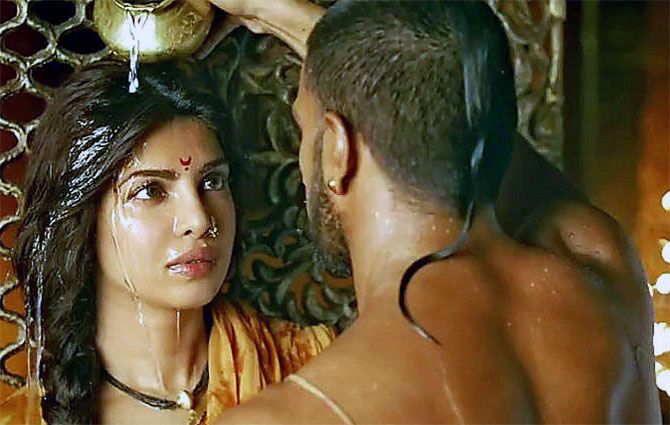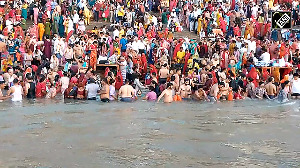'This is a giant film, a magnum opus drunk on its own magnum-ity, and it is perfectly clear early on, as the narrative races out the gate and gauntlets are flung up in the air and shot through with arrows, that a film like this can only work as opera,' says Raja Sen.

There is much to marvel at in Bajirao Mastani.
There are the sets, lavish and excessive and opulent. There are the performances, lavish and excessive and opulent. There are the principal characters, lavish and excessive and opulent. There is the film's running time, lavish and excessive and opulent. So packed with sheer scale is this film that director Sanjay Leela Bhansali scrimps -- only -- on the nuance, deciding that detailing is best left to the art directors and to the crafters of hula-hoops for Deepika Padukone's nose.
This is a film painted with the broadest strokes, with characters taking turns speaking in exposition, and in couplets.
Which is fine. This is a giant film, a magnum opus drunk on its own magnum-ity, and it is perfectly clear early on, as the narrative races out the gate and gauntlets are flung up in the air and shot through with arrows, that a film like this can only work as opera.
Tragic, then, that it ends up a soap.
In many ways, watching Bajirao Mastani is like binge-watching those unending mythologicals all over our television channels, and while this might seem like a dig, one should note that mythological serials, even those stumbled upon accidentally on a Sunday morning, do make for compelling viewing at least for a couple of minutes.
(Would you like to mainline ten back to back episodes of Devo Ke Dev Mahadev, though? If yes, you're in luck.) So a television mythological that actually has excellent production values? What's not to like?
Plenty.
Bajirao Mastani opens with a disclaimer that says it doesn't claim to be an accurate representation of Peshwa Bajirao of the Maratha Empire, but while it acquits itself from giving us history, we could certainly have done with a story.
The film starts off at breakneck speed, as narrator Irrfan Khan sets up the characters as fast as if he were doing 'last week on' recaps, but the narrative soon runs out of steam.
Sadly, this is when the characters have just about found their feet and are longing for drama, but Bhansali -- favouring obsessively choreographed dance sequences over a plotline -- denies them this, making sure actors and audience are mired in limbo.
It is pretty enough as limbos go, but you can only get that far looking at latticework. Also, for all the talk of painstaking period detailing over a 400-day shoot, all that shows through is beauty. Everything is pristine, everything is polished, everything is newly minted. The film is set over many years, but neither heroines nor palace floors age even a day.
Cinematographer Sudeep Chatterjee captures this magnificence well, but the visuals only look compelling when the camera is high above all the elaborate symmetry, like when we see rows and rows of green leafs plated flat for Brahmins to feast on.
There is, alas, too little of this and too many battle sequences that are either visually incoherent or rationally so -- there is one Rajnikanthian assault that is particularly laughable. As is a badly animated tiger.
What is good, however, is very good. Ranveer Singh brings his character to life and does so with both machismo and grace, his Peshwa Bajirao slicing down soldiers like a lehnga-clad golfer wielding a too-sharp niblick. Singh gets both gait and tongue right, and while he luxuriantly enunciates every syllable in sight -- kudrat becomes coudrut, kismat becomes keeismat -- he stays impressively consistent.
The performance is solid, be it when planting his hand imperiously on his wife's head so she can untie his gauntlet, or when, forced to christen a child, he pauses his bravado just so, while coming up with Shamsher.
Visually, too, the character is poetically captured, with a pendulum of pearls hanging from his turban or rain bouncing off his hardly-hairy pate. There are times, when in all his finery, that he jangles as he walks, like a belled cat.
What better metaphor to suit a man caught between two women?
Padukone -- as Mastani, the fiery warrior princess -- looks dazzling, but her performance is wishy-washy. She starts off smiling oddly through grim dialogue and then appears to be making sword-noises with her mouth when in battle. We can't hear her over the thundering score, but she has the exact same expression boys with lightsabers sport while making their own sound effects.
Her Mastani is obsessed with Bajirao, and while it was perhaps the film's requirement that Padukone look giddily entranced, there are times when she appears completely lost.
It doesn't help that she's entirely eaten up by Priyanka Chopra, who, while not in the title, owns Bajirao Mastani. Her role is that of the moral right, but Bhansali goes out of his way to imbue her character with selflessness and dignity.
Chopra's terrific in the part, her intelligently expressive eyes speaking volumes and her no-nonsense Marathi rhythm bang-on, but having the film side so obviously with her -- placing her on a pedestal over the two lovers, even -- is a narrative misstep.
The most awful oversight, however, is how this film has been promoted with the most massive of spoilers. The whole second half of Bajirao Mastani could have been kept alive with the germ of intrigue about a confrontation between Chopra's Kashi Bai and Padukone's Mastani: How will they collide, will they ever see eye to eye, will one kill the other, and so forth.
But the entire film turns flaccid because it has been sold to the audience on the back of a song that features them merrily dancing together in matching sarees, telling us that none of the stakes are high enough to matter. Or sharp enough to draw blood.
Bhansali, for what it's worth, has gone all out with this one. He's made warrior girls play the banjo; he's made Old Spice salesmen look old; he's created outrageous, mostly fountain-based subtext about husbands and wives getting each other wet; and he's even saluted world cinema and raised a few red lanterns.
If only he had more to say than the fact that he loves Mughal-e-Azam.
Rediff Rating: 











 © 2025
© 2025